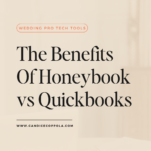Are you a wedding pro or creative business owner looking for a streamlined platform to handle your business finances and operations? As a business coach for over a decade now, I know how powerful knowing your numbers can be, and I’m so glad you’re here. Today, I’m diving into HoneyBook vs. QuickBooks – two popular platforms that aim to simplify and enhance your experience as a business owner.
Whether you're a wedding planner, photographer, or any other wedding pro, choosing the right platform can make a world of difference in terms of efficiency, organization, and, most importantly, your bottom line.
While I’m a big fan of Honeybook (I used it for ten years as a wedding planner, and I still use it in my coaching business today), Quickbooks does have more robust accounting features (at least at the time of writing!). Today, I’m breaking down the strengths and weaknesses of both platforms, comparing key features like project management, invoicing, expense tracking, and reporting.
By the end of this article, you'll have a crystal clear understanding of which platform offers the best features for your wedding business. Now, let's get started!

Let’s Talk about the Why People Use Honeybook First
Y’all know I LOVE Honeybook. Honeybook is a people-first company and a leading platform that focuses on providing creative professionals with the tools they need to manage their businesses and deliver exceptional client experiences. One of the standout features of Honeybook is its intuitive interface. That means they make it easy to navigate and use, even for those who are not tech-savvy. The platform offers a wide range of features that can help you streamline your workflow and save time. From creating professional-looking proposals and contracts to managing invoices and payments, Honeybook has you covered.
In addition to its user-friendly interface, Honeybook also offers features specifically tailored to creative professionals' needs. For example, the platform allows you to create branded client portals to share files, communicate with clients, and collaborate on projects. This not only helps YOU stay organized but also enhances the client experience. Honeybook provides a centralized hub for all communication and project-related information. Basically – it shows you have your sh*t together.
Another benefit of using Honeybook is its emphasis on client communication. The platform allows you to send automated emails and reminders, ensuring that you stay in touch with your clients throughout the entire project lifecycle (and get paid on time!). This helps you build stronger relationships with your clients and saves you time and effort by automating repetitive tasks.
Next, Let’s Talk About Quickbooks
Quickbooks, on the other hand, is a widely recognized accounting software that caters to businesses of all sizes and industries (from solopreneurs to 7 figure business owners). Quickbooks provides a complete set of features to effortlessly track expenses, generate reports, and manage payroll – it's got you covered.
One of the standout features of Quickbooks is its ability to seamlessly integrate with your bank accounts, credit cards, and other financial institutions. This means you can effortlessly import transactions and reconcile accounts, saving you precious time and ensuring absolute accuracy in your financial records.
And while I do personally prefer Honeybook’s invoicing features (and that sweet ka-ching sound when you get paid!), Quickbooks does offer invoicing capabilities, allowing you to create sleek, professional-looking invoices, easily track payments, and send friendly reminders to clients with outstanding balances.
Another huge benefit of using Quickbooks is its extensive reporting capabilities. As a business coach, I’m always encouraging wedding pros to treat their business like a real business – and that means you need to know your numbers.
On top of everything else, Quickbooks offers a wide range of pre-built reports to gain insights into your business's financial health, cash flow, and profitability. You can even customize these reports to fit your specific needs, ensuring access to the most relevant information. Plus, Quickbooks integrates with third-party apps and services, expanding its functionality and compatibility with your existing tools. From CRM systems to project management platforms, Quickbooks delivers flexibility and scalability to meet your unique business needs. While it might be more than you actually “need”, it’s nice to have all the data at your fingertips!
Pricing Comparison Between Honeybook and Quickbooks
When selecting the perfect software for your business, pricing becomes a crucial factor to ponder. Let's dive into the pricing plans of Honeybook and Quickbooks so that you can make an informed decision.
Honeybook offers three different plans to suit your needs (from $19/month to $79/month). I have a complete breakdown of the pricing and features here (as well as the best Honeybook promo code!). This plan includes unlimited projects, online payments, and client management features. Plus, Honeybook offers a free trial, allowing you to test the platform before committing to a subscription.
On the other hand, Quickbooks offers multiple pricing plans to cater to businesses of different sizes and needs, which range between $30/month-$200/month. While the starter plan is often enough for the solopreneur, for those looking to grow a team (or have inventory – like rentals!), you must opt for one of the higher-tier plans.
Now, let’s dive deeper into three core feature categories: project management, invoicing, and financial reporting.
Honeybook vs. Quickbooks: Project Management
When it comes to project management, Honeybook really stands out from Quickbooks. Its comprehensive suite of features makes creating and managing projects a breeze. I love how the home dashboard gives me a quick overview of the progress and lets me stay on top of my projects with the visual project timeline. And with Honeybook's integrated messaging system, communicating with clients is seamless. It's easy to share files, gather feedback, and keep all client-related information in one place. Unfortunately, Quickbooks doesn't offer anything close to this level of functionality!
Honeybook vs. Quickbooks: Invoicing
HoneyBook offers a comprehensive invoicing system that enables you to create and send professional invoices to your clients. With customizable options for branding, line items, and payment schedules, you can tailor your invoices to fit your needs. HoneyBook also simplifies the payment process by allowing you to accept online payments, ensuring convenience for your clients.
With Honeybook, keeping track of payments and overdue invoices is also a breeze with real-time notifications and integrations with popular payment gateways (so you have more control over how you get paid!). Plus – Honeybook recently offered the option to sign up for Instant deposits, meaning you get paid less than 24 hours after your client’s pay! For solopreneurs who may be living paycheck-to-paycheck, this is a HUGE advantage.
On the flip side, QuickBooks is well-known for its powerful invoicing and payment processing features. It lets you create professional invoices with your own touch of branding and set up recurring invoices for clients with ongoing projects. QuickBooks seamlessly integrates with popular payment processors, making cash flow smooth and enabling online payments. With features like payment tracking, reminders for overdue invoices, and automated payment reconciliation, QuickBooks gives you real-time visibility into your cash flow. Plus, it provides a convenient way to capture and store receipts, making expense management a breeze.
So which is better? While both Honeybook and Quickbooks will do the job, I personally think Honeybook invoices are more aesthetically pleasing (and I love that you get paid quicker because the invoice can be automatically sent out after they sign the contract without needing a third-party integration). This is huge for your workflow!
Honeybook vs. Quickbooks: Financial Reporting
While HoneyBook offers a range of features to manage your projects and invoicing, its financial reporting capabilities are somewhat limited compared to QuickBooks. The platform provides basic reports like income breakdowns and expense summaries. However, if you're looking for more advanced reporting features, you might find HoneyBook lacking in that regard. When it comes to tax preparation, for example, HoneyBook doesn't integrate directly with tax software. This means you'll have to export your financial data from HoneyBook and manually import it into your preferred tax software for accurate calculations and filing. But don't worry. It's still a manageable process to ensure your taxes are done right.
QuickBooks is unbeatable when it comes to financial reporting and tax preparation. With a wide range of customizable reports, you'll gain valuable insights into your business finances quickly. Generating profit and loss statements, balance sheets, and cash flow reports is a breeze with just a few clicks. Plus, QuickBooks lets you create and customize reports based on your specific needs. And when it's tax time, QuickBooks seamlessly integrates with popular tax software like TurboTax, making tax preparation a piece of cake. Rest assured, your financial data will be accurate and compliant. Let QuickBooks take care of the numbers, while you focus on growing your business.
In terms of financial reporting, QuickBooks is the clear winner. With its advanced reporting features and seamless integration with tax software, it becomes a game-changing tool for freelancers seeking deep insights into their business finances.
Customer Support: Honeybook vs. Quickbooks
I am going to be unapologetic when I say that Honeybook wins the customer support category – hands down! Honeybook offers FREE customer support through email and live chat during business hours. They've got you covered with an extensive knowledge base, video tutorials, and helpful articles to get you up and running smoothly. And hey, don't forget about the vibrant Honeybook community forum where you can connect with other users and learn from their experiences. Not only will Honeybook help you use their software, they provide a ton of education to help you grow your business too! It's all about supporting each other!
Quickbooks, on the other hand, offers significantly less customer support. You’ll likely have to call in, and some of the support is a paid-for service. That being said, because it is a popular software, there are plenty of tutorials online both from Quickbooks AND other creators, so it shouldn’t be too hard to find what you need if you’re running a “simple” business.
When it comes to user reviews, both Honeybook and Quickbooks have a strong reputation in the industry. Honeybook is praised for its user-friendly interface, exceptional client communication features, and overall ease of use. Quickbooks, on the other hand, is highly regarded for its comprehensive accounting tools, extensive reporting capabilities, and integration options.

Should You Use Honeybook or Quickbooks? Which is Right for Your Business?
My answer might surprise you. But the truth is… you might want to use BOTH (at least for now). In my opinion, Honeybook is an excellent choice for creative professionals who prioritize client communication and want a user-friendly interface. On the other hand, Quickbooks provides a comprehensive suite of accounting tools that can help you know your numbers and grow a PROFITABLE business.
My recommendation? Take advantage of the free trials offered by both platforms to explore their capabilities and assess which one aligns best with your goals. BUT don’t be afraid to use both. For example, maybe you want a strong hold on your numbers, so you want to use Quickbooks for that. But, you also want to create wow-worthy proposals and automate your leads-to-bookings process! You are going to want Honeybook for that! Since you can subscribe to both for less than $100/month, I highly recommend using them to streamline your financial management tasks, save time, and focus on what you do best – growing your business and delivering exceptional experiences to your clients.
Explore More Wedding Industry Resources
- Honeybook vs. Dubsado 2024 Reviews: Which CRM Is The Best?How to Start a Wedding Planning Business
- 2024 Honeybook Review: Is Honeybook Worth It And What You Need To Know Before You Sign Up
- Stand Out in a Saturated Market: Performing a SWOT Analysis as a Wedding Planner
- Honeybook 2024 Pricing & Plans: Which Honeybook Plan Should You Choose For Your Business?
- 7 Ways to Use Honeybook as a Wedding Planner
- 5 Ways to Make More Money As A Wedding Planner
- How to Book Your FIRST Client as a Wedding Planner
- Here’s What Every Wedding Planner Needs To Include In Their Wedding Design Proposals
- 5 Social Media Mistakes Every Wedding Planner Makes
- Braden Drake On How To Unf*ck Your Business Taxes & Fix Your Finances
- What Are The Best Resources For Wedding Planners?
- How To Create An Offboarding Process In Your Biz
- Wedding Pros: Here’s How to Create A Better Customer Onboarding Experience
- How To Start The Wedding Planning Process With Your Clients
- Are You a Disorganized Wedding Planner? Let’s Fix That With These Organized Wedding Planner Tips!













+ show Comments
- Hide Comments
add a comment